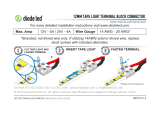
The ML-Series Remote Battery Switch/Solenoid Switch provides high-current carrying and
switching under load. The Remote Battery Switch/Solenoid Switch is installed close to the battery banks.
A single pole double throw (SPDT) Control Switch Panel, or two momentary push button switches, operate
the Remote Battery Switch/Solenoid Switch. Control Switches are installed in a convenient location near
other electrical controls or companionway (see Illustrations on reverse).
The Manual Control Override Knob provides (Remote Battery Switch Only):
• an added level of safety that allows manual ON-OFF control with or without power
• LOCK OFF for servicing the electrical system
A remote LED (sold separately) indicates a closed connection between battery bank and load, or between
two battery banks when used as an emergency cross-connect.
Remote Operation. The momentary (SPDT) (ON)-OFF-(ON) Remote Control Contura Switch can
provide cross connect and/or battery isolation. The Control Switch should be mounted in a convenient loca-
tion near helm controls to allow for quick access.
Emergency Manual Control Override Operations (Remote Battery Switch Only)
* If the Control Switch is held ON or OFF for 5 seconds, the internal coil protection will engage and the
Remote Battery Switch/Solenoid Switch will not respond to further remote input for approximately
10 seconds.
ML– Series
Remote Battery Switches (with manual control)
PN 7700 / PN 7702
Solenoid Switches (without manual control)
PN 7701 / PN 7703
• Magnetic Latch—draws no current in ON or OFF state, only draws current when changing state of switch
• Silver alloy contacts provide high reliability for switching live loads
• Manual control override knob provides an added level of safety allowing control with or without power, and
offering LOCKED OFF capability for servicing (Remote Battery Switch ONLY)
• LED output to remotely indicate switch state
• Tin-plated copper studs for maximum conductivity and corrosion resistance
• Label recesses for circuit identication
Specications 12VDC 24VDC
Cranking Rating See table below See table below
Intermittent Rating See table below See table below
Continuous Rating See table below See table below
ML-Coil Function Bi-Stable Bi-Stable
Operating Voltage (contacts) 0-64V 0-64V
Control Voltage 9-16V DC 18-32V DC
Amperage Operating Current 0 mA continuous 0 mA continuous
<7A when changing state (20 ms) <4A when changing state (20 ms)
Terminal Stud Size 3/8"-16 3/8"-16
Maximum Terminal Stud Torque 140 in-lb (15.8 N•m) 140 in-lb (15.8 N•m)
Ring Terminal Size 3/8" (M10) 3/8" (M10)
Terminal Ring Diameter Clearance 1.18" (30 mm) 1.18" (30 mm)
Live Current Switching 10,000 @ 12V, 300A 10,000 @ 12V, 300A
10,000 @ 24V, 150A 10,000 @ 24V, 150A
2,000 @ 48V, 100A 2,000 @ 48V, 100A
Mechanical Switching 100,000 Cycles 100,000 Cycles
RemoteSwitchPN2145
Action Momentary SPDT (ON)-OFF-(ON)
Seals Internal & External Gasket Panel Seal
Mounting Hole 0.83"x 1.45" (21.08 mm x 36.83 mm)
LED Rating 100,000 hours half-life
Regulatory Meets ISO 8846 and SAE J1171 external ignition protection requirements, CE marked, Rated IP66
Marine Electrical Prod
ucts
Remote Battery Switch
PN Termination
Manual
Control
Control
Circuit
7700 Tinned Wires Yes 12V DC
7702 Tinned Wires Yes 24V DC
Overview of Application
To connect battery bank to load, or combine
battery banks
Momentarily depress control switch actuator to “ON”.
Remote LED indicates closed connection.*
To disconnect battery bank from load, or
isolate battery banks that are connected
Momentarily depress control switch actuator to “OFF”.*
To connect battery bank to load,
or combine battery banks
With Override Knob in (REMOTE position),
push button until latched (Push to Latch On).
To disconnect battery bank from
load, or isolate battery banks that
are connected
Rotate Override Knob to right to release button
from Latch On mode (button pops up). Rotate
Override Knob to left (REMOTE position).
To prevent remote operation
Rotate Override Knob to right
(LOCK OFF position).
To secure for servicing
With Override Knob in (LOCK OFF position),
pass cable tie through hole.
1
2
Solenoid Switch
PN Termination
Manual
Control
Control
Circuit
7701 Tinned Wires No 12V DC
7703 Tinned Wires No 24V DC
Wire Size and Current Ratings
Blue Sea Systems, Inc.
4600 Ryzex Way
Bellingham, WA
98226 USA
Phone 360.738.8230
www.bluesea.com
990180170 Rev.006
Wire Size
Cranking
30 sec.
Intermittent
5 min.
Continuous
(UL 1107)
2/0 AWG (70 mm²) 1,000A 400A 225A
4/0 AWG (120 mm²) 1,100A 400A 300A
2× 4/0 AWG (2x 120 mm²) 1,450A 700A 500A



